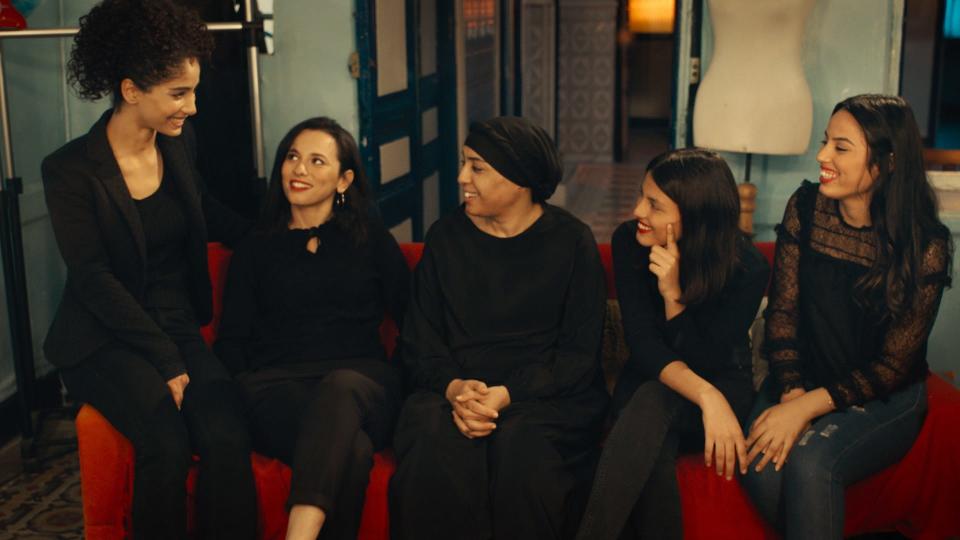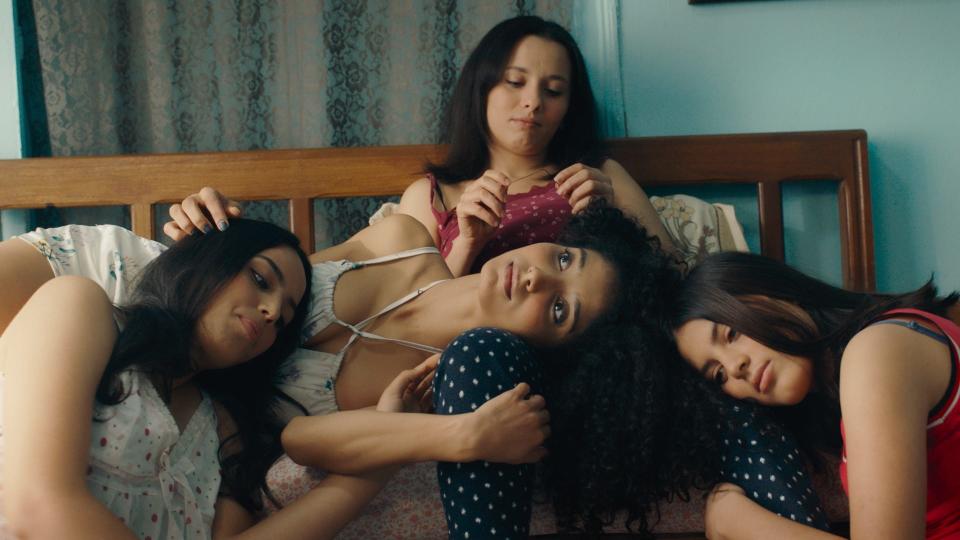Review: 'Four Daughters' takes an exciting approach to documentary filmmaking
Note: This review originally published on Next Best Picture.
The story of Olfa Hamrouni and her four daughters — Eya, Tayssir, Rahma, and Ghofrane — has been covered in the Tunisian media for years, but is presented to worldwide audiences in Kaouther Ben Hania’s film “Four Daughters” in such a unique way. Her elder daughters Rahma and Ghofrane were “devoured by the wolf” years ago, but what exactly happened to them isn’t revealed until much later in Ben Hania’s film.
Rather than just speak to the family about the events leading up to their disappearance, Ben Hania goes in a new direction. She blends conventional documentary talking head interviews and live conversations with reenacted scenes from the family’s life, played by Olfa and her younger daughters, as well as Nour Karoui and Ichraq Matar, who play Rahma and Ghofrane, respectively, and popular Egyptian-Tunisian actress Hend Sabri, who stands in for Olfa when scenes are too upsetting.
What we get is a wholly captivating film that takes documentaries to a new level and focuses on the meaning of family, womanhood, shame and radicalization.
Olfa is a no-nonsense kind of matriarch who is tough on her daughters, but only because she has gone through the same. Before she had her children, she stood up for herself in the face of oppressive men, as various reenactments show. In one, she stands nearby and observes as Sabri and Majd Mastoura act out her wedding night when her husband tries to force himself on her. Though she can laugh about the harrowing memory now, we see just how difficult a life she has lived, but she has continued to stand tall.

It must be so strange to have various moments of your life played out in front of you, but it doesn’t seem to distract the family too much. Instead, it leads to very lively, unrehearsed conversations among all of them and prep among the actors. In one beautifully captured scene, Sabri is seen reciting lines and trying to get the right cadence of Olfa’s voice down. Viewers at home rarely see that kind of prep work for films, making this such a sacred moment to observe.
As tough as Olfa can be, she’s raised equally spunky daughters who love their mother but also have lived through immense trauma. Eya and Tayssir, along with their stand-in older sisters, recount nights when their father would come home drunk and start badgering all of them.
After they left their father, Olfa started seeing someone (also played by Mastoura) who sexually abused her daughters. In one challenging scene, Mastoura storms off and says he can’t continue the scene because of its uncomfortable and brutal nature. Eya says he’s an actor and should know it’s just a scene in a movie. But on a deeper level, it serves as a way for the girls to move on from that dark chapter in their lives.
There’s always an ethical dilemma with documentaries when it comes to making their subjects relive traumas, and that’s the most difficult aspect of this film. When Olfa and her younger daughters see Karoui and Matar as Rahma and Ghofrane, there’s joy in the prospect of doing the film, but moments later, immense sadness takes over all of them as they remember what happened years prior.

By this point, it’s safe to reveal that Rahma and Ghofrane, teenagers at the time, left their families to join the Islamic State in Libya. There was worry that their younger sisters would join or potentially be kidnapped, which led to them staying at a juvenile center for their protection.
Knowing all that the family has been through, it’s even harder to watch the film and see them relive pivotal moments, like when Rahma and Ghofrane started to wear a hijab or niqab or how they were “acting out.” It’s almost cruel to see them struggle with certain scenes, and sometimes even say they can’t look at an actor because it reminds them too much of their missing loved ones. There’s also no doubt in anyone’s mind that the three women wish they could play those moments differently and hope for better outcomes.
As the family reenacts their life, the asides they have are equally interesting, especially as Eya and Tayssir open up about their relationship with their mother. They’re open about the times she has hurt them, whether it was “warranted” or not, and Eya doesn’t shy away from saying she wanted to strangle her mother for the ways she was treated.
Their mother equally does not shy away from saying she never wanted daughters, nor from calling them “whores” for their actions or for the “what ifs” that go through a parent’s head when raising young women. Even Sabri gets into heated arguments with Olfa about her overly conservative and traditional views on womanhood. Not only does it add drama to the film, but it offers valuable insights into another culture and the way children are raised and women are regarded.
There is one main question that comes from watching “Four Daughters:” Why did Ben Hania decide to make the film in its unique format? Well, we never really get an answer. It could have been a way to help this family heal and move on from dark chapters. But does making them relive so much pain and causing them emotional distress, as seen so many times in the film, make it worthwhile? Only Olfa, Eya, and Tayssir can tell us.
In the end, “Four Daughters” shows us just how far documentaries can be pushed to bring something new to the genre. It’s a complicated watch in many ways, but just like the best documentaries out there, Ben Hania keeps it honest throughout her film, whether the scenes are scripted or unscripted.
How to watch
What: "Four Daughters" screenings at the Palm Springs International Film Festival
When and where: 2:30 p.m. Jan. 6 at Mary Pickford is D'Place; 8:45 p.m. Jan. 9 at Regal Cinemas Palm Springs; 4:45 p.m. Jan. 13 at Regal Cinemas Palm Springs
Cost: $15
More info: www.psfilmfest.org
Ema Sasic covers entertainment and health in the Coachella Valley. Reach her at [email protected] or on Twitter @ema_sasic.
This article originally appeared on Palm Springs Desert Sun: Review: 'Four Daughters' tackles documentary filmmaking in new way
